The Maximo Park Interview
Artist Q&A
with Nick Parker
and photographs
by Anne Cook
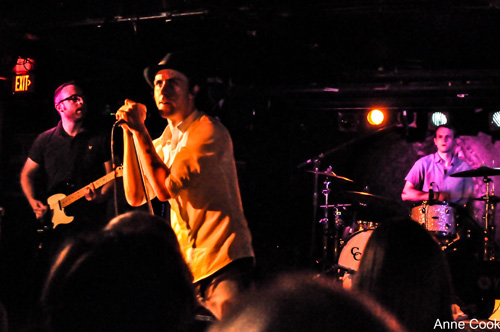
This Summer, Maximo Park released perhaps their best work to date with "The National Health". Since that time, the five piece from Newcastle Upon Tyne Britain have toured the World. We caught up with members Paul Smith and Duncan Lloydhere in Boston, just before they kicked-off their now completed US Tour..
NICK PARKER (RSL): Thanks for talking with us. So, today is the first day of this US tour, yes? Do you still find it intimidating as you get into it?
PAUL SMITH: These dates don’t seem intimidating any more to us at all. Having done longer tours in the past and got through by the skin of our teeth, this one is a bit easier. We’re also a bit older and we can pace ourselves a bit better. We don’t want to repeat our past misdemeanors! We can handle it better, and we’re also aware that we haven’t been here for a while and you tend to loose momentum in terms of people getting to know the band, so for us to come over hear is a bit of leap of faith. We know we’re on a small label, and we’ve got to try and reach people. We’re quite zealous about our music, and the fact that it can make an impact on people, so you feel like you’re going out there to prove yourselves every night.
RSL: So that sense of hunger is still there is it? You still feel as much energy now as you did on your first trip over here?
DUNCAN LLOYD: Yeah definitely. Luckily we able to produce music quite consistently, and it’s never really stopped, so I guess being a little bit older we understand what we do more, and things like with this seven-date tour compared to the first one, when we first came over the sound was all over the place, and we got really bad reviews, because we didn’t really know what we were doing. This time around we’re been around the block a few times, so now we really want to just put on a great show and connect, and to leave people with a great memory of the night they saw us.
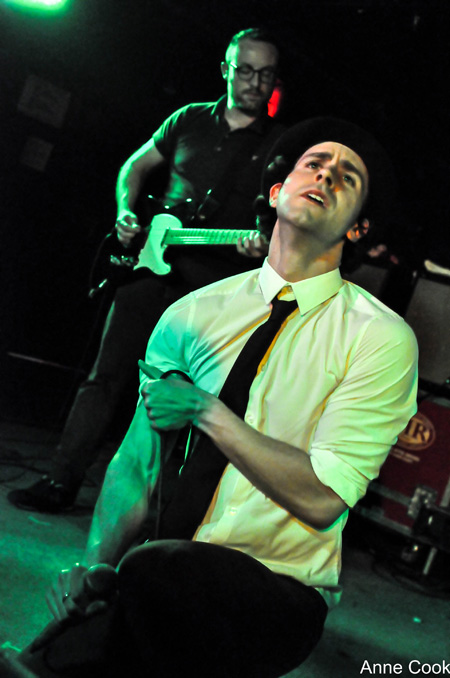
RSL: The last time you were here I saw you at Paradise, and it was a really great show, and blew me away. You have so many dates though, can you manage to remember a particular show? Do you have any specific memories about Boston from your times here before, as a place to play? Do you have any sense of connection to this city?
PAUL: I remember the Paradise yeah. I remember the look of the place and small things. We played here [at the Middle East] too, in 2006, and you remember things in fragments, like all memories. Doing the sound check today, it came back to me – the place, the audience from that night. But we never really stay in a place to too long in America, except for LA and NYC, where you tend to do a lot of press and that kind of stuff. We made our 3rd album in LA for example, so we’re definitely been to some places in America for longer. Boston is a bit more fragmentary: I remember going round Fenway Park the night before the gig last time, and stuff like that. You try and cram in as much as you possibly can. Boston's a picturesque place…
DUNCAN: And there's such a history of great bands that have come out of this town too. It's sad though that you just start getting into a place and then you have to leave. We're lucky to have at least a little time in all these places though.
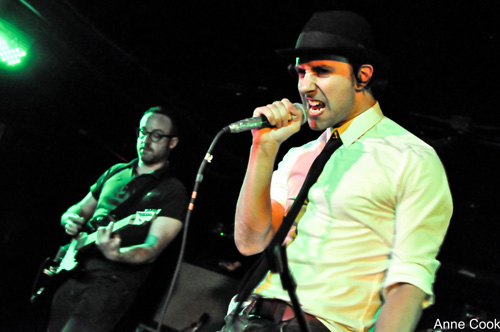
RSL: I'm from the North (of England) myself, and I remember thinking from the first album you did [2005’s “A Certain Trigger”], that it was a great thing to have this kind of music coming from the North. Is that something you care about a lot, in term of the background and roots that you have? Particularly on the lyrical side, is there some image that you want to portray (or dispel) about the North and the Northerner?
PAUL: There's an image of the Northern working class man that is generally disparaging, and I think for me music and art, and all those things that Northerners aren't 'supposed' to like are such a big part of our lives, and getting that across in the songs is a byproduct of who we are, so in many ways it couldn't be any other way. The key thing about our lyrics is self-expression – getting something out – we just try to get our feelings on disc, and then every night on stage try to express ourselves and hopefully people can connect with that. Obviously people from the North will have a kind of recognition but also there's a universal quality to the songs that have helped us to have some appeal around the world. For those people, you can get a sense of place in some of the songs – like songs about the coast, and people in mid-west might find ideas like that somewhat exotic. Because they have those kinds of details in them though, they are about something more specific, and not just trying to appeal to everyone in a bland way. People can latch on to us because they feel like "yeah, that's their thing." But we all share similar emotions, so that way you can always get a feeling for what we're all about.
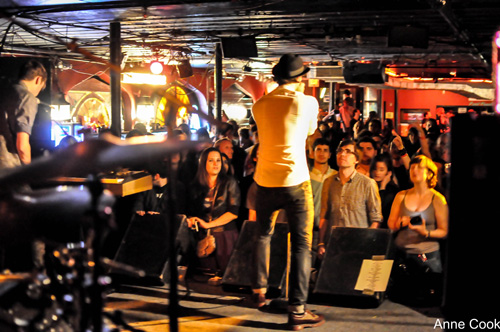
RSL: Turning to the new album [“The National Health”] I read that it's very much more about the current political and social climate, in Britain and the wider world, of recession etc., than earlier records. For me the band has always produced more intimate, emotional music, less politically orientated. Where do you draw the line between the personal narratives and social commentary? How do you balance those two things?
PAUL: I'd say if it feels right, just do it. The members of Maximo Park don't share a single particular political position on things. You have to reflect the time you're living in, and each record should be a document of where your mind is at that point – the music we listen to, etc., our tastes at that time will filter in and they will add onto the tastes we already had. It's the same with the lyrics – the lyrics are different this time around, but it's not a political album, because we don't make that kind of music, and that kind of music, in my head at least, is usually like being beaten with a stick, and saying "this is how you should think." This is a political record with a small 'p.' It's also about the personal as well, and trying to come to terms with the world in which you're living, and I think that's what we're all doing most of the time – balancing how we interact with the world and other people. Some days you're more wrapped up in yourself and your own problems, and other days you think “what can I do?” or “how do I relate to the world?” or "how do I associate with other people in the street?" There is a warmth about our recordings though, that I think makes clear to people how we see the world: with a yearning for something more in a lot of the songs, and that yearning extends outwards a bit further on the new album I'd say.
RSL: As one example of a change then, the first track on the new album, "When I was Wild," was a much more restrained opening to an album than anything you've done before. Was that a very deliberate choice, and if so what led to it?
DUNCAN: I guess we were coming back with a new record after a break, and we want to do something unexpected. It's a very different sound, and that was one of the last songs to be written. It could also hint at some other areas we could go in the future. We've been listening to some quite experimental old B-sides, and a lot of people haven't heard that kind of stuff from us. This is a really stripped-back sound, and then we hit you in the face with that second song, when the album kicks off!
RSL: All the way to the end!
DUNCAN: Yeah, and there's a thread all the way through the album, it is an observational one about what's going on, and whether it's an emotional one, we hint at that too.
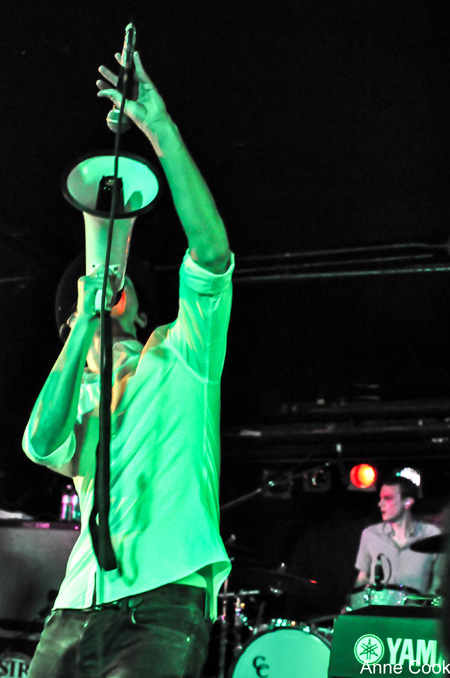
PAUL: At one point it says "Must the artist bleed/ Over the new production?" In many ways the rest of the album responds to that question. There's a lot of cathartic lyrics in our discography – getting something out of your system and screaming at the world – but there's also something very romantic about the music, and our view of the world. So when you come to a new album you're thinking, "what are we really trying to do here?" As a lyricist I'd say I'm probably more stable in my life than ever before, but there's still turmoil in your personal life, even though it's not like massive break-ups and stuff like that. So I think that the artist doesn't really need to bleed for the new production. There's enough chaos outside of yourself and in some ways the older you get, if you can find a central, stable point to look at the world, you can actually sharpen your view, and that's why you end up looking outside you-self a bit more, because you're no longer so self-obsessed! We want to try and create a lot of diverse moods across the record, we tried to spin it all around in different ways, and throw different things into the mix.
RSL: The first thing I heard from the new album was your performance of "The Undercurrents" at the NME offices in London. On the lyrical side, there are some really good examples of very mature song-writing on that track, and I wondered if you could talk about your process in producing that stuff. For example the couplet "Same as the house where I was raised/ Safe in a haven single glazed" is a great example of that kind of tight vignette. In that case, can you say how that was created? Did you agonize or labor over writing something like that? Does it come easily?
Brand New Music Video!
PAUL: I probably spend more time on it now purely because we have more time to spend! A lot of the lyrics on the first album were written from a very impulsive standpoint, and yet I sort of slaved over them to, somewhat, but they were quite different. As time’s gone on I’ve definitely wanted to be more descriptive in the lyrics, and I’ve tried to make them as rich as they could possibly be, without them being too ‘ripe.’ “The Undercurrents” is a good example of a track where it has that sort of interweaving that goes with the atmospherics of the music, so I wanted to match that. With that one, we went through a number of different options for the chorus before we finally got it right, so it was quite an agonizing song, just trying to get it right. The chorus is very simple, and that’s the key to the song in the end – the song has this complexity and then is has this very simple release, which goes with the music.
Sometimes things just come up off the top of your head. I’m always thinking about words and trying to read and keep my brain tick over. It’s easy to just switch that off, if you’re not careful. Things will come to me like couplets. I always thought “it doesn’t have to rhyme - it should just be a good lyric,” but at the same time if you do manage to get something that rhymes really well it sticks in people’s heads and it help them with the song, and it’s hopefully something I’ve refined over the years. On the second album I tried to expand on the first, and so on. In that case we were making quite an ‘earthy,’ ‘live’ album for example, and the lyrics had to suit that. We’ve done that now, and we now have a sort of repertoire which we can build on and expand our lyrical and musical artillery. These days I feel like I have more to work from, and I can isolate points where I want to be simple, and other points where I can think I can almost ‘get away with it,’ without the listener thinking it is complicated or too worked on. With “The Undercurrents” things still need to roll off the tongue, but I wanted to paint a picture of a time and place, and that nostalgic feeling. That couplet you’re talking about in particular – you start off with one idea and end up thinking about something quite different. I started off just thinking I would write a song about going for a walk, and then it was a wet day, and you start noticing the sound of the tires rushing through the water, which made me think of the sound of a shell held to an ear, ok, we’ve got that, and I used to live in a place where the windows were thin and you could hear noise from the road outside all the time, and that’s like the sound of the shell, and listening to a shell’s sound felt like something a kid might do, which ties it to your youth. So there are different chapters in the song.
Sometimes things just come up off the top of your head. I’m always thinking about words and trying to read and keep my brain tick over. It’s easy to just switch that off, if you’re not careful. Things will come to me like couplets. I always thought “it doesn’t have to rhyme - it should just be a good lyric,” but at the same time if you do manage to get something that rhymes really well it sticks in people’s heads and it help them with the song, and it’s hopefully something I’ve refined over the years. On the second album I tried to expand on the first, and so on. In that case we were making quite an ‘earthy,’ ‘live’ album for example, and the lyrics had to suit that. We’ve done that now, and we now have a sort of repertoire which we can build on and expand our lyrical and musical artillery. These days I feel like I have more to work from, and I can isolate points where I want to be simple, and other points where I can think I can almost ‘get away with it,’ without the listener thinking it is complicated or too worked on. With “The Undercurrents” things still need to roll off the tongue, but I wanted to paint a picture of a time and place, and that nostalgic feeling. That couplet you’re talking about in particular – you start off with one idea and end up thinking about something quite different. I started off just thinking I would write a song about going for a walk, and then it was a wet day, and you start noticing the sound of the tires rushing through the water, which made me think of the sound of a shell held to an ear, ok, we’ve got that, and I used to live in a place where the windows were thin and you could hear noise from the road outside all the time, and that’s like the sound of the shell, and listening to a shell’s sound felt like something a kid might do, which ties it to your youth. So there are different chapters in the song.
RSL: So it’s kind of chain on connections?
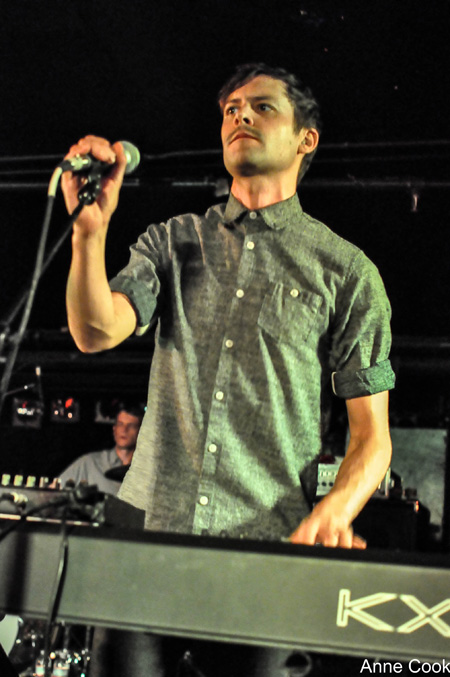
RSL: So when you do the live thing, and you’ve clearly spent a lot of time crafting, and building intimacy in the songs, how you still manage to project so much energy in the set? How do you balance that – being both energetic but not just furious - still keeping an emotional connection with the audience?
PAUL: It feels like there is a kind of code in the songs, and every time you play it you kind of tap into that code and it gets into your DNA. Then your movements and your emotions are controlled by the song. So it can go from one end of the scale to the other. If one song is fierce and angry, and another is a love song, as soon as you strike it up the mood guides you into that – for me of course, because I don’t usually start the songs, so I have a little time to get into the mood of it. You [Duncan] can talk more to how you initiate things though.
DUNCAN: Yeah it’s weird because it feels instant to me. I never have to sum-up the energy to get it moving – it just feels like it’s already there. And as soon as Tom [English – Drummer] gets started, you can sit on that feel of it, and it’s never felt hard. It’s lucky because there five different elements in each song, and you can tune in to each one, so it doesn’t get tired. A lot of that is down to the audience too – the way they react. We seem to have audiences that just react and get into it, and that drives it.
RSL: I see what you mean. It feels to me like there are bands that are louder than yours, and bands that are faster than yours, but you’re emotionally driven along with it with Maximo, so it effects you more.
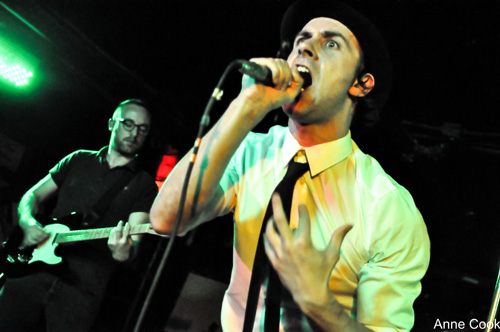
Oct 11 TMN ao Vivo Lisbon, Portugal
Oct 15 Magazzini Milan, Italy
Oct 16 E-Werk Erlangen Erlangen, Germany
Oct 19 Astra Kulturhaus Berlin, Germany
Oct 20 Werk II; Halle A Leipzig, Germany
Oct 21 Große Freiheit 36 Hamburg, Germany
Oct 23 Gibson Frankfurt Am Main, Germany
Oct 24 X-Tra Zurich, Switzerland
Oct 25 Tivoli Oudegracht Utrecht, Netherlands
Oct 27 Live Music Hall Cologne, Germany
Oct 28 La Gaîté Lyrique Paris, France
Oct 28 La Gaîté Lyrique Paris, France
Oct 29 Botanique Sint Joost Ten Node, Belgium
Nov 01 O2 Academy Liverpool Liverpool, United Kingdom
Nov 02 O2 ABC Glasgow Glasgow, United Kingdom
Nov 03 O2 Academy Newcastle Newcastle Upon Tyne, United Kingdom
Nov 05 Plug Sheffield, United Kingdom
Nov 06 Manchester HMV Ritz Manchester, United Kingdom
Nov 07 O2 Shepherd's Bush Empire London, United Kingdom
Nov 09 HMV Institute Birmingham Birmingham, United Kingdom
Nov 10 Pyramids Centre Portsmouth, United Kingdom
Dec 30 Falls Festival - Marion Bay Hobart, Australia
Dec 31 Falls Festival - Lorne Lorne, Australia
Jan 02 Corner Hotel Melbourne, Australia
Jan 03 The Hi Fi Sydney, Australia
Jan 05 Southbound Festival Perth, Australia
Oct 15 Magazzini Milan, Italy
Oct 16 E-Werk Erlangen Erlangen, Germany
Oct 19 Astra Kulturhaus Berlin, Germany
Oct 20 Werk II; Halle A Leipzig, Germany
Oct 21 Große Freiheit 36 Hamburg, Germany
Oct 23 Gibson Frankfurt Am Main, Germany
Oct 24 X-Tra Zurich, Switzerland
Oct 25 Tivoli Oudegracht Utrecht, Netherlands
Oct 27 Live Music Hall Cologne, Germany
Oct 28 La Gaîté Lyrique Paris, France
Oct 28 La Gaîté Lyrique Paris, France
Oct 29 Botanique Sint Joost Ten Node, Belgium
Nov 01 O2 Academy Liverpool Liverpool, United Kingdom
Nov 02 O2 ABC Glasgow Glasgow, United Kingdom
Nov 03 O2 Academy Newcastle Newcastle Upon Tyne, United Kingdom
Nov 05 Plug Sheffield, United Kingdom
Nov 06 Manchester HMV Ritz Manchester, United Kingdom
Nov 07 O2 Shepherd's Bush Empire London, United Kingdom
Nov 09 HMV Institute Birmingham Birmingham, United Kingdom
Nov 10 Pyramids Centre Portsmouth, United Kingdom
Dec 30 Falls Festival - Marion Bay Hobart, Australia
Dec 31 Falls Festival - Lorne Lorne, Australia
Jan 02 Corner Hotel Melbourne, Australia
Jan 03 The Hi Fi Sydney, Australia
Jan 05 Southbound Festival Perth, Australia
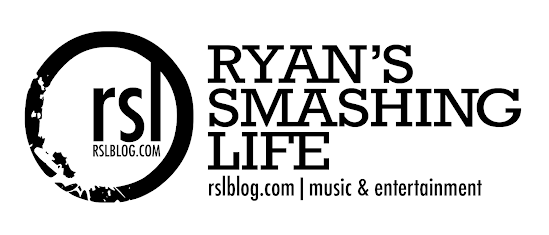
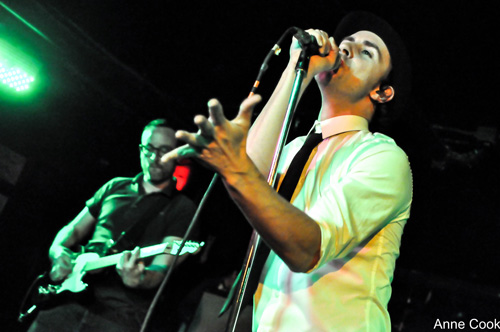


Comments